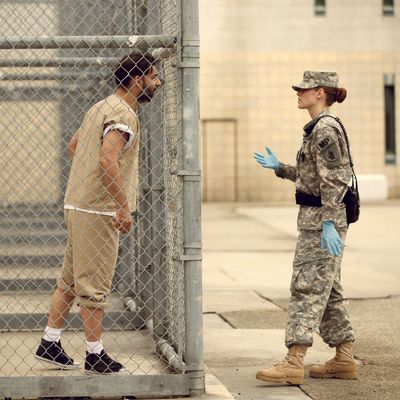
Peter Sattler’s Camp X-Ray starts off with images of 9/11, followed by scenes of a Muslim man being captured at home and whisked off to Guantánamo Bay. But the film is not nearly as grandiose and politically minded as that suggests. It’s really a chamber piece between two people. Almost literally so: Most of the movie is set in a small, nondescript cement holding area at Gitmo lined with a few bolted doors. The place doesn’t even look like a prison. It looks more like an empty hospital waiting room. Or, more appropriately, a psych ward.
Our two protagonists are Cole (Kristen Stewart), a quiet, tense, young guard who has just arrived at Camp X-Ray, and Ali (A Separation’s Peyman Maadi), a man who has been imprisoned there for eight years. No, wait, sorry, Ali has been detained there for eight years; we’re not legally supposed to call them prisoners, because that would mean they have rights under the Geneva Convention. Ali isn’t like the other detainees; most of them don’t even dare look at Cole. (“These guys just don’t like girls,” a fellow guard tells her. “It’s an Arab thing.”) Instead, Ali engages Cole in conversation through the narrow window of his cell and asks her for the last Harry Potter book. He’s read the previous six during his time here, and has been waiting for the meager prison library to get the seventh one for two years. He’s eager to find out if Severus Snape is really a good guy or not.
Is Ali himself a good guy? At first, the film is noncommittal. Not long after he and Cole initially seem to bond, he flings his own shit at her. A sudden, horrific act, perhaps, but a glance at the man’s file suggests that Ali has been acting out for years; you might too if you were held without being charged in a small, windowless room for nearly a decade. Was he nuts before, or has he simply been driven to madness by the existential horror of his fate?
As Cole, Kristen Stewart is a good fit. In some of her more notable past roles, her tense, clipped delivery has read like disassociation from the material. But here, we get it. Words come in nervous bursts to her. She’s alienated from the prisoners, she’s alienated from her fellow guards, and she can’t really get off this island. Her world is as much a prison as Ali’s is. And so, Stewart’s tendency to keep her emotions bottled up becomes an asset. (Between this and the upcoming Clouds of Sils Maria, in which she’s terrific, the actress finally seems to be getting the right roles.) This is a gray, unglamorous performance, and it’s pitched just right.
At times, the screenplay itself rings curiously simplistic. Not so much in a political sense, but in the way it juxtaposes the guards’ experiences with the inmates’, and with one another. Late in the film, Cole has lunch with a soldier who complains about how much nicer the detainees have it than the guards — the kind of sentiment that’s supposed to make us groan at his cluelessness, but that rings instead like a cheap screenwriter’s ploy. We get entirely too many frustratingly pat little moments like this.
Luckily, the film is on more solid footing when focusing on the drudgery of life at Gitmo, and on the minute little interactions through which its two central figures come to know each other. That latter point is a testament to these two actors, who give these characters life, in deceptively lifeless circumstances. Watching Ali and Cole (and, of course, Stewart and Maadi), we find ourselves wishing that they would genuinely get the chance to better understand each other. Do they, by the end? We’re not sure. On that score, Camp X-Ray remains admirably open-ended.


